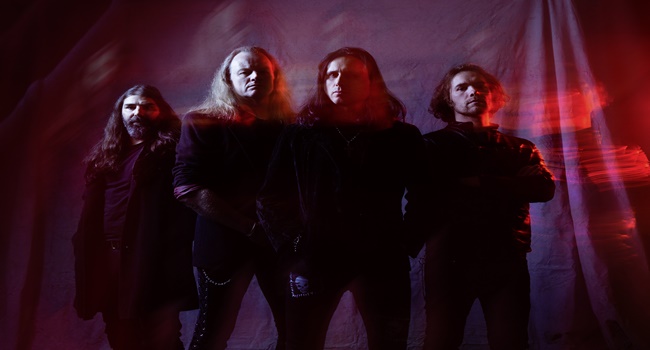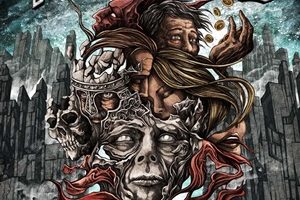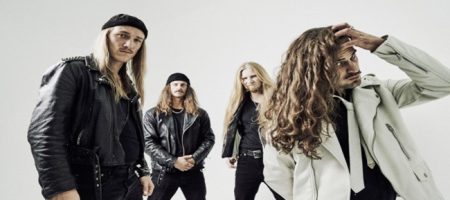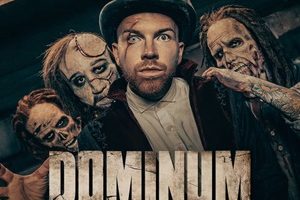Firewind – Mindful When United
Sunday, 10th March 2024
Photo: Tim Tronckoe
Glorious times for melodic power metal followers – especially when a new Firewind album hits the streets. Stand United as the tenth studio record sees these gentlemen continue to deliver stellar songwriting chock full of memorable riffs, engaging melodies, and the killer shredding guitar work of Gus G. we’ve known to appreciate since the start of the group. We reached out to Gus to discuss the process behind the record that differed this time from previous outings – how touring has been since the pandemic finished, thoughts on finally headlining in America for the first time in over a decade, his evolution as a songwriter, pivotal moments touring with Arch Enemy and being in the Ozzy Osbourne band that made his career, as well as future plans.
Dead Rhetoric: The latest Firewind album is Stand United, the tenth studio record for the group. How do you feel the songwriting and recording process went for this set of material?
Gus G.: The recording was done in different parts throughout the year because we were so busy touring. We wanted to finish the album much faster, but we couldn’t. It was a little bit like also… it happened like that because the label prompted us to focus on singles mainly. They thought that the focus should be on singles, and eventually that will become part of an album. In the long run, it was nerve racking because we are so old school – used to going into the studio to record albums, finish it within a month or two. And this album took eight months to finish (laughs). We had touring obligations with Firewind, and I had other tours with my solo band. And then we did festivals in the summer, so it took a while.
On the bright side of things, it gave us more time to think about the lyrics, the vocal melodies, and work on a lot of the details. I did think that made a bit of a difference on the final product. Where will this fit in the discography? Only time will tell with any record. I do think though that there are quite a few songs on the track list that will stay on the setlist for a long time. That’s how I rate our albums nowadays – how many songs are we playing from an album in the set? That shows how powerful each album or how strong each album is. We have ten albums behind us, so putting a setlist together is pretty hard. I feel it’s one of our strongest records we’ve done, and I feel very strongly about it, let’s see how it will be with the ultimate judge, our fans.
Dead Rhetoric: Since AFM was wanting you to release so many singles at first, was it difficult out of this batch of material what you wanted to put forward first?
Gus G.: I had a pretty good idea of what songs to go for. I knew that releasing a couple of singles, these would be my choices. We put out the first song almost a year ago, which was “Destiny Is Calling”, that was one of the album highlights. We released that on tour with Beast in Black, we just wanted to put something new out because it already been three years since the pandemic and the last album came out. I would have picked “Fallen Angel”, which turned out to be one of the singles too. Now we’ve put out half the album already – we’ve never released so many singles to one album.
Dead Rhetoric: It seems like a different approach that many different labels are taking these days. Putting out more singles before the album comes out – do you enjoy this change that may give the album more legs long-term?
Gus G.: To be brutally honest, I didn’t think it was really necessary. We could get away with one or two songs less. On the other hand, it’s honest for us. We are giving half the album away. You don’t have any reason to be like, I’m not going to pick up this album. You’ve heard five out of the ten songs. You either like it or you don’t like it. How shitty can the rest be? (laughs).
Dead Rhetoric: Did you feel you had the additional comfort with Herbie now being in the band for a few years to craft stronger melodies within his range compared to the circumstances that took place last time?
Gus G.: Yes, absolutely. This was a lot more comfortable making this record. It was great to have Herbie on board, he was really into it. Back in 2019 when he joined, you didn’t know if it was going to work out – we were under a lot of tight deadlines and time pressure to finish the record. I was stressed to make another announcement for yet another singer, not knowing if people would still listen to the band after this. The people who do like us. The pandemic helped me, psychologically – the beginning at least. Because everybody got stuck at home, we didn’t have to care as much but put out the record and let the music do the talking. We were home for a long time.
We’ve done a couple of tours; he’s been in the band for almost five years now. It’s good to have a valuable partner like Herbie.
Dead Rhetoric: You mention that many of the lyrical concepts this time focus on the importance of mankind uniting rather than fighting each other about issues in the world regarding environmental disasters, global wars, and the pandemic. Where do you think the average person needs to dig deeper to contribute more uplifting outcomes to these issues?
Gus G.: Wow, a good question, a deep question – and very philosophical! But I’m Greek, so we invented philosophy. (laughs). I don’t know, in all honesty it’s a utopic thought. You can’t have everybody agreeing on everything. Maybe it shouldn’t be like that. It’s more a reminder to be more mindful. To think that all we have is each other. Maybe because I’m getting older, or it’s just that I feel as time goes by people are getting meaner to each other, thinking of themselves and only themselves. That kind of humanity has slipped away. In daily life I experience that, in professional relationships that I have with people. Maybe I’m just a romantic guy, still.
Dead Rhetoric: I agree that it feels like it’s easier for people to tear people apart rather than be positive and lift people up, work out issues, etc.
Gus G.: If you think about it, the whole cancel culture that we have been going through, these things are just so sensitive. You can’t say anything, especially after the pandemic – going out on the street, people were ready to fight. It feels like everybody wakes up in a bad mood constantly. What are you getting out of that? I think humanity is more polarized than ever. It didn’t used to be like that, back in the day. We just need to think about these things, that’s all. I wrote this also for the band, feeling united after all these years – we are in a good place.
Dead Rhetoric: How would you assess the growth or advancement in your abilities to express yourself as a guitarist and songwriter from the early stages of Firewind to where you are today?
Gus G.: For me, it’s all about evolving and growing as a person, as an artist. I always look to inject new things into our music and develop what I started when I was in my early twenties. I’m not saying I wasn’t coming up with cool stuff back then – but I was younger, and I had a different kind of energy inside of me. I still have that energy inside of me, but now I have more knowledge. That’s the point – as you grow you are more mature. The constant question I ask myself is: do you have artistically anything to say with Firewind? I don’t just want to throw out albums out there just for the sake of it. If I want to experiment, I can do that now – I have my solo albums where I can do whatever comes to my mind. With Firewind, I always ask myself this question. Do we have anything to say twenty years later?
I want to make albums that count. I want to make good stuff that will hopefully stand the test of time. Evolve the sound – we are not the kind of band that invented the wheel or reinvented the wheel. We are not the most original or innovative, but we have our own sound, our own style. I want to develop and take that style further with each album. I’m always trying to inject small things into our music, to keep it fresh. It’s not easy to do, believe me after ten records. But we try to do that, and it’s always on my mind when we are making a new Firewind record.
Dead Rhetoric: It does seem like you do your best to try to come up with fresh melodies or hooks, elements that are catchy enough while retaining the originality – which can be tough?
Gus G.: Yeah. It’s not like if you have heard our albums before, you will put on a new album and be shocked by what has happened. Our albums have variety – if you go back to the first album, listen to something from the middle of our career, and then the new one – there are variations and of course different singers throughout that time. The music also has evolved. The guitar riffs are there, the solos, certain melodies. I want to experiment with arrangements, vocal arrangements, melodies. A good example is “Fallen Angel” – that’s a song that has typical Firewind elements, the melodic shredding, the riffs, but it also has the extra stuff – even some more 80s synths on there. Almost a more modern metal breakdown after the chorus too. Trying out things that we haven’t done before.
Dead Rhetoric: Tell us about the killer metal reinterpretation you tackle on this record with “Talking In Your Sleep”, originally a hit for The Romantics in the 80s?
Gus G.: Was that a hit in America?
Dead Rhetoric: Yes, it was – a top ten hit as a matter of fact…
Gus G.: Ok, great. The thing is this is a song always on the radio here. Whenever I am in the car, that song always comes up. We had an endless list of songs to cover – and we wanted as a band to do one. That discussion never went anywhere, because all the songs we would mention have been done so many different times, by metal bands at least. But this one – it wasn’t a smash hit like “Maniac”, but it’s a great song. I suggested it to the guys, and it turned out that everybody loved that song. I Googled it to see if there are any metal covers of it – and luckily there were none. We will be the ones that do it, and it will be fun.
Dead Rhetoric: What was touring like for Firewind when you were finally able to hit the stages once the pandemic restrictions were lifted? Do you believe more people in general (the fans as well as the musicians) have a newfound respect or outlook for live performances that previously may have been taken for granted?
Gus G.: I want to say yes. I have the feeling that people are excited again about going out again and just being entertained. Getting a couple of beers, watching a band play live – that whole experience. Everybody wants to erase these two years from their minds. Especially when we first went out in 2022, and we had these tour offers to do this again. I’m a seasoned professional, and I’ve been touring since I was a kid – I felt like I was eighteen years old again. We got a call from Dragonforce at the last minute, as their special guest had cancelled – and they asked us if we could do the tour six weeks away. If we could get the visas, we would do it. We managed to get the visas, and I couldn’t find a tour bus. Everybody was touring at the same time – especially America, as that was the first country that opened up after the pandemic. We did the tour in an RV, totally punk rock, it was the best tour ever. We were like little kids, sleeping on the couch in the RV. It was amazing, one of the most amazing experiences ever.
As you get older you want different comforts, otherwise you just won’t do it. I was like, we are going to do this, go out there and have a good time. That was the same vibe in the audience every night. I think that excitement is still there now.
Dead Rhetoric: I remember that was your first tour here in nine years – as I saw you on the headline tour with Nightrage, White Wizzard, and Arsis in 2013. Were you upset that you hadn’t toured the US for so long?
Gus G.: I was. There are two things that had to do with that. The first one is the band went on a hiatus after 2013 for about four years, basically. I went out to do my solo stuff – I did come back to the US to do some solo tours, small tours. There was no Firewind for a few years. Those were times I wasn’t sure I wanted to bring the band back. Once I did bring it back, the Immortals album, then the problem became that some of the guys didn’t want to tour in America. We should just do shorter tours, keep it here in Europe. Because if you go to America, you have to stay on the road for four or five weeks to make sure you get a return on the investment. Some guys in the band were not keen on that. The album was well-received, but we did not tour on that in America. I was upset about that.
We can’t just keep touring in Europe. When I made the choice to change the lineup, make the self-titled record in 2020, we were going to start in North America with a tour with Symphony X, then the pandemic hit. Before you know it, it’s been almost a decade that went by.
Dead Rhetoric: Did the pandemic have any positive (or negative) effects that had to be worked through for the musicians within Firewind – either on a personal or professional basis?
Gus G.: Everybody was in the dark. Nobody knew what was going to happen. I can only speak for myself, the first year was a relief. I realized I needed this break, it felt like I was on the road non-stop since I was a kid. I had a good excuse, it’s happening to the whole world, nobody can leave their house. I just stayed here; I had saved enough for a rainy day. I stayed at home with my family and my cats. Just do YouTube, live streams, keep in touch with people and our fans. The second year in 2021, I made a solo record that was all instrumental, that was cool. No pressure at all. I was itching to get back on the road. Every time they announced new measures and restrictions, I thought it was more depressing. Towards the end of 2021 into early 2022, it was depressing. That was a negative thing, I was feeling it.
Early 2022 when things slowly started opening up, we jumped at every opportunity. And it snowballed from there. Everybody in the band felt similar feelings, we had to get out of the house.
Dead Rhetoric: What has Gus G. learned about himself as a person and a player in your early 40s that may have grown or differed from who you were as a person going through your 20s and 30s?
Gus G.: I pay a lot more attention to lyrics now when I’m making a song. When I was in my twenties, I just didn’t care what the lyrics said, as long there was a shredding solo and a cool riff, that’s all that mattered. The older we get, the words must have more meaning. Not a lot has changed. I still love the sound of distortion, the sound of heavy guitars, shredding solos. I’m still the same guy.
Dead Rhetoric: What would you say is a pivotal or critical moment that helped shape your musical career?
Gus G.: There were many. It was not just one. There were a couple of moments. One was definitely my involvement with Arch Enemy as a touring guitarist in 2005 because that was my first experience with a professional band. A band that had crew, management – up until then, it was all like we didn’t know what we were doing. All on the go, finding out as you go, I had nobody to tell me anything. Here’s a record contract – okay, I’ll sign it. I didn’t have a guitar tech. Playing every show that would come our way, building things like that. Getting an opportunity to tour with an established band and see that world, see how it works – yeah, that was a bigger turning point.
And a bit later on, my involvement with Ozzy Osbourne. That was getting to see and be a part of that big machine, how the big guys do it. Then it’s like- yeah, it’s fun, but it’s also very serious. I was in a pretty serious position, it’s scary as hell, but once you accept that challenge you try to make the best of it. Try to come through that somehow, on the other side, I guess. These two professionally speaking, they were very important to the career thing.
Dead Rhetoric: How do you maintain the balance between your musical activities and your business responsibilities when it comes to your career? Is it important to foster solid relationships with people you trust to accomplish what you want to achieve this deep into your career?
Gus G.: Yeah. It’s hard to separate the two sometimes. I’m also the manager of the band, I deal with the day-to-day things. I’m the guy who’ll talk to the booking agent, the record label people, the PR people, the tax accountants, the travel agents. So many people are involved. We had a manager for ten years, and then in 2016 I took the initiative and handled it all myself. It was a great decision; I don’t regret it as I’m a hands-on guy for a lot of things. I’m a very DIY guy, I like being independent. We are still like that very much as a band.
It’s easy to lose balance with the artist side of me. I try when I write music to not think about the business side of things. When I make music and play guitar, I just try to shut that part of my brain down, be creative and have fun. I want to play the stuff that I like and hopefully somebody else will like it. You have to find balance, like everything in life. It’s important to build good relationships within the band and also the people that are surrounding the band. The people that help us to make this a reality. To put the albums together, to put the tours together.
Dead Rhetoric: What’s on the agenda for anything related to Firewind over the next year or so for touring, festival appearances, other activities?
Gus G.: We are going to go on tour the day the album comes out. Kicking it off in Europe on a month-long tour with Masterplan. Then we come to the states in April and May with Edge of Paradise and Immortal Guardian. We are doing twenty plus shows – and then we go to Japan after that. The first leg of the tour is going to be a long one. I’m real excited – it will be our first headlining tour in the states in over a decade. It’s a risk to test the waters, we’ve been away for so long. It will be a busy year, all the way to the end. More gigs in the fall.
Right now, another solo album is a distant thought for me, I’m so in Firewind mode. Eventually there will be another solo record when I have some down time to write. Right now, it’s pure chaos for the album launch – maybe in the summer I’ll have more time to relax in Greece to think about the future.




























